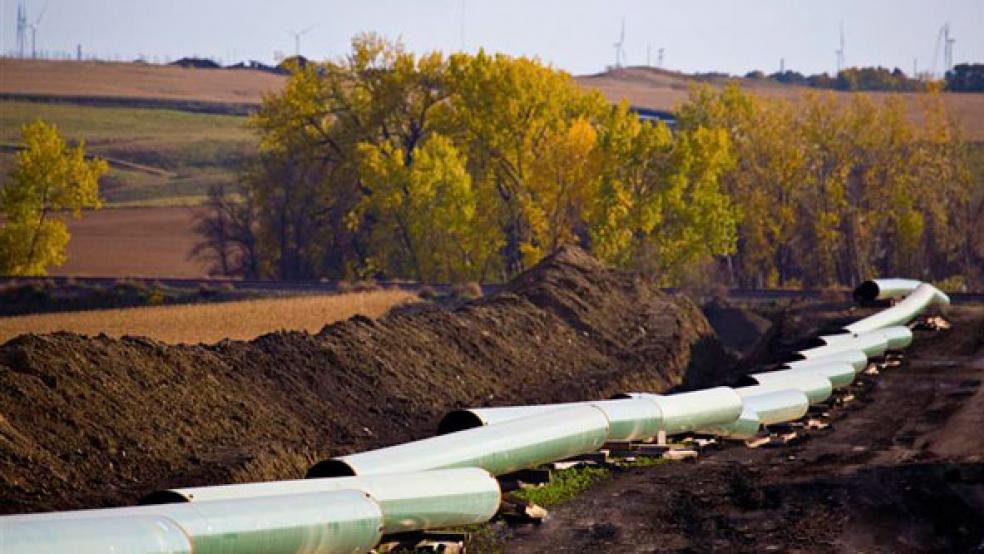On 6 July, a Montreal, Maine & Atlantic train carrying 72 tank cars filled with oil exploded after its brakes apparently failed, sending it rolling into the small Quebec town of Lac-Megantic, where it derailed and then exploded. In the conflagration that followed, an estimated 47 people were killed.
Whether Canadians like it or not, the use of such trains has soared in recent years. The Railway Association of Canada reports that as recently as four years ago Canadian railways moved just 500 carloads of crude oil, but that number has now soared to about 140,000 carloads annually.
RELATED: RUNAWAY TRAIN DISASTER CAN CHANGE THE ENERGY DEBATE
While currently only about three percent of Canadian crude is currently transported by rail, one industry predicts railway carriage of oil products rising to as high as 25 percent by 2035.
Now, in a breathtaking display of chutzpah, the Canadian ambassador to the U.S. is warning President Obama if he does not approve the controversial Keystone XL pipeline, then he can expect similar oil trains and even trucks to enter the U.S. Ambassador Gary Doer said, “His choice is to have it come down by a pipeline that he approves, or without his approval, it comes down on trains. That’s just the raw common sense of this thing, and we’ve been saying it for two years and we’ve been proven correct. At the end of the day, it’s trains or pipelines.”
RELATED: WHAT IS THE KEYSTONE XL OIL PIPELINE?
Greenpeace Canada publicized a May 2012 Transport Canada memo that reported that the department had "identified no major safety concerns with the increased oil on rail capacity in Canada, nor with the safety of tank cars that are designed, maintained, qualified and used according to Canadian and U.S. standards and regulations. Indeed, Canada and the U.S. work collaboratively to ensure the harmonization of rail safety requirements." In the wake of the Lac-Megantic tragedy Greenpeace Canada recommended that the federal government implement an immediate ban on shipping oil in the older, type 111A tanker cars that that the Canadian Transportation Safety Board has identified as spill-prone, reinstate mandatory two-person minimum train crews; and begin a comprehensive, independent safety review of all means of hydrocarbon transportation, including public hearings.
Greenpeace Canada Climate and Energy Coordinator Keith Stewart observed, “Transporting oil is always risky, but both rail and pipelines can be a lot safer than they are today. Breaking our addiction to oil is the only real solution and something we must do to combat climate change, but as we make the transition to clean energy we must reduce the harm from transporting and using oil.”
In the wake of Lac-Megantic derailment, Transport Canada issued a series of emergency orders, some of which incorporate the Greenpeace Canada suggestions. Starting immediately, at least two crew members must work trains that carry dangerous goods and no locomotive attached to a tank car filled with dangerous materials can be left unattended on a main track.
In defending itself against a rising storm of criticism, The Railway Association of Canada points to the Canadian rail industry’s improving safety record, emphasizing that the number of derailments, including those involving dangerous goods is stable or decreasing.
Adding to the defensive chorus, Canada’s Transportation Safety Board noted that 2012 there were four main-track derailments involving dangerous goods, below the 2008-12 annual average of eight incidents and that there were 32 derailments involving hazardous materials in 2012 below the 2009-12 annual average of 37.
The Railway Association of Canada asserts that “99.9977” percent of all hazardous goods shipped by rail reach their destination without a release caused by a train accident, adding that the railway oil spillage rate is lower than for pipelines.
All of which will no doubt comfort the remaining citizens of Lac-Megantic.
Who may have to wait a long time for compensation, as Montreal, Maine & Atlantic Railway chairman Ed Burkhardt said the company is now depending on its insurers to begin paying for the cleanup and provide compensation, raising doubts publicly on whether the company will even survive.
How much money is involved? Estimates range from $500 million to more than $1 billion. So, no doubt to prevent such a debacle in the U.S., Ambassador Doer believes that Obama will approve Keystone XL.
Such a deal.
This article originally appeared at Oilprice.com. Read more from Oilprice.com:
Will Quebec Tragedy Derail Heavy Oil Upswing?
TransCanada Might Rethink Potential Keystone Launch Date
$1 Billion of Natural Gas Wasted in North Dakota Through Flaring in 2012




